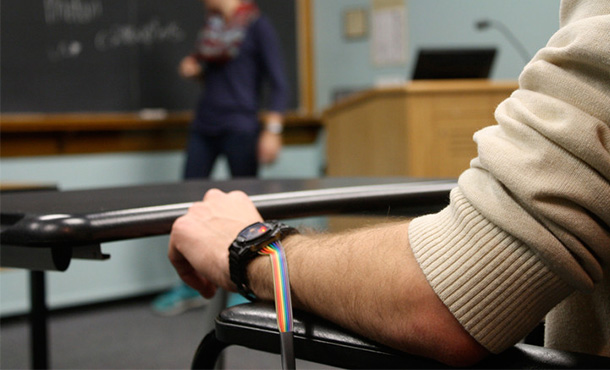
A device to improve the lives of people with nonverbal communication disabilities was the grand prize winner of the inaugural Inc. U pitch contest, held in November 2015 on the University Park campus.
Engineering students win first prize in Project Vive U. pitch contest and secure $15k in funding
01/12/2016
A Penn State undergraduate student startup that is developing a device to enhance communication skills for children with cerebral palsy was the grand prize winner at a recent pitch contest sponsored by Investing in New Student Companies at Universities (Inc. U).
Six teams — two apiece from Bucknell University, Penn State and the University of Pittsburgh at Johnstown — competed in the event, held Nov. 15, 2015, as part of Penn State's Global Entrepreneurship Week. GEW is held the third week of November to inspire people to participate in local, national and global activities designed to explore startup potential.
Each team delivered a two minute, 30 second product or concept pitch followed by five minutes of Q&A with four judges, said Liz Kisenwether, assistant professor in the School of Engineering Design, Technology, and Professional Programs and one of the organizers of the Inc. U contest at University Park.
"The judges had $30,000 to award, based on the pitches and a two-page business overview. They were particularly interested in the students' understanding of the problem or need, and the viability of delivering a marketable product," said Kisenwether.
Biomedical engineering senior Mary Elizabeth McCulloch and electrical engineering senior Rodney "Trip" Miller delivered the pitch for Project Vive that won the first-place prize of $15,000.
McCulloch, a Schreyer Scholar, describes their device as a glove with a sensor that calibrates to the user's movements.
"Most kids with cerebral palsy can move at least one joint, so we slip it on close to that location. The child then moves his or her elbow, knee, etc. to select what he or she wants to say from a menu of commonly used phrases that the child hears through an earpiece," she explained.
The Project Vive unit then assembles the phrases and "speaks" for the user.
Although McCulloch has entered similar pitch contests, she said competing against teams from other universities was a little nerve-racking.
"The format of the contest was like a true shark tank. Each team went into a separate room and could only come out when it was their turn, so we didn't even get to see the other pitches," she noted.
The $15,000 funding from Inc. U will be used to form an Institutional Review Board to help review product features and performance.
"Even though our prototype is totally noninvasive, we want to make sure we have a third party that can verify that our device is not harmful and justify that it's for a good cause, especially since we're working with people with disabilities," McCulloch explained.
Ultimately, she and Miller would like the device to be as small and affordable as possible so that it can be used in developing countries.
First-year engineering student and Schreyer Scholar Matt Roda also competed in the Inc. U pitch contest. His company, Reflexion Interactive, is developing a device to help diagnose concussions more efficiently and effectively.
Roda said the product, a 4-foot by 6-foot board that fills the user's field of view, includes 60 lights arranged in a circular pattern. The lights randomly turn on, and the person standing in front of it has to touch each light as quickly as they can.
"It's kind of like playing Whack-A-Mole. The next light goes on as soon as you touch the previous one, so it's measuring how fast you are going over a set period of time," explained Roda.
The user's reaction time and accuracy is then compared against a baseline to determine whether or not he or she has a concussion.
The most challenging aspect of competing in the Inc. U pitch contest was summing up the device in two and a half minutes, said Roda.
"There is so much information, so it was difficult to decide what was most important to share with the judges in that short amount of time," he explained.
Roda didn't place in the contest, but he isn't letting that get his spirits down.
"This is something I'm passionate about. I truly believe this product has the potential to help the next generation of athletes," he said.
One team from Bucknell and one team from the University of Pittsburgh at Johnstown were each awarded $7,500 by the judges.
The pitch competition was filmed at the WPSU studios for the show "The Investment." It will be broadcast at 8 p.m. on Jan. 14 on WPSU-TV.
The Inc. U contest was made possible by funding from the Pennsylvania Department of Community and Economic Development, which awarded the University of Pittsburgh at Johnstown $500,000 to work in collaboration with Bucknell and Penn State to foster undergraduate entrepreneurship.
As part of the "Discovered in PA - Developed in PA" Initiative, the goal of Inc. U is to develop an environment for student startups across campuses and the region through pitch competitions and coordinated university programs and resources.




